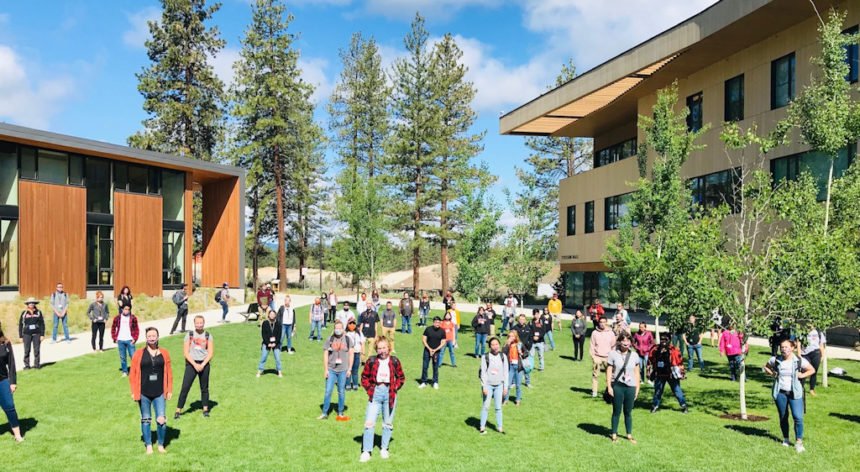OSU-Cascades students gain valuable experience during COVID-19 sampling project

BEND, Ore. (KTVZ) -- Risa Christie, Alaric Hartsock and Jessica Thomas were among 70 trained field staff knocking on doors of randomly selected homes in late May in Bend as part of Oregon State University’s TRACE-COVID-19 study to help understand the prevalence of the virus in the community.
For Christie, Hartsock and Thomas, all former or current OSU-Cascades students, the project provided hands-on experience and the potential to make a local and global public health impact.
“A lot can change in the coming years, but this has heightened my interest in working in the public health field,” said Thomas, who graduated from OSU-Cascades in 2018 with a biology degree and is now studying to become a registered nurse. “I would love to join a residency at the Centers for Disease Control and Prevention in Atlanta after I get my RN.”
TRACE, short for Team-based Rapid Assessment of Community-Level Coronavirus Epidemics, is among the first efforts in the nation that provides an overview of a community’s COVID-19 wellness.
The effort in Bend builds on a similar sampling in recent weeks in Corvallis and among the first in the nation that will provide an overview of an entire community’s COVID-19 wellness. The Bend sampling results are expected soon.
TRACE leaders hope to bring the project to other communities in the future.
TRACE is a joint effort of five OSU colleges – Science, Public Health and Human Sciences, Agricultural Sciences, Engineering and the Carlson College of Veterinary Medicine – and OSU-Cascades in Bend, and a partnership with the Benton County Health Department and Deschutes County Health Services.
The project provides important epidemiologic information that has been lacking throughout the pandemic and is helpful in establishing what percentage of people in a community, including those who are not demonstrating symptoms of illness, test positive for COVID-19.
Traditional health workers serve as leads on the TRACE survey teams and are each supported by one or two student workers. Traditional health worker is an umbrella term for front-line public health workers who work in a community or health care system under the direction of a licensed health provider.
Traditional health workers handle the interaction with residents, asking questions and explaining the process, while students like Christie, Hartsock and Thomas provide support.
“Some (people) weren’t interested in being tested, and others had seen it all over the news and were thrilled to be tested,” said Christie, a biology major at OSU-Cascades.
Hartsock, a computer science major at OSU-Cascades, experienced the same enthusiasm. “People would drive up and ask to be tested,” he said. “But we couldn’t as we had to follow the study instructions and the random testing.”
Participants in TRACE provide basic demographic information and are given a nasal-swab test kit that they administer to themselves inside their home and to their minor children, if they want them to take part. TRACE field staff wait outside residences, and study participants leave the completed test kits outside their front door.
Field staff maintain a safe distance at all times and do not enter any residences. Field staff are also tested once a week for the virus and wear protective gear at all times. Completed tests are submitted to the Willamette Valley Toxicology lab in Corvallis to be tested for SARS-CoV-2, the novel coronavirus that causes COVID-19.
COVID-19 was first reported to the World Health Organization on Dec. 31, 2019, and has been confirmed in more than 6.9 million people worldwide and killed more than 400,800 people. In the United States, there have been more than 1.9 million reported cases – including nearly 5,000 in Oregon – and more than 110,000 deaths nationwide. Benton County has had 60 confirmed cases and five deaths. Deschutes County has had 134 confirmed cases and no deaths.
Hartsock is not sure where his career will take him, but he hopes to own his own business one day. Watching the pandemic unfold and participating in the TRACE study has opened his eyes to an area where his growing technology skills may be helpful.
“I think there’s a lot of room for improvement and disruption in the health care industry,” he said.
Christie was also enthusiastic about the TRACE project.
“I love the work that we got to do,” she said. “I got to meet so many interesting people and it’s something really beneficial to our community, as we have no idea how the virus is spreading. This study is going to help us get a better concept of that, and actually make a difference.”
Asked if they would be willing to work on the project again when it travels to other communities, Christie, Hartsock and Thomas expressed enthusiasm for future service with the study.
The TRACE study is being funded by OSU, the David and Lucile Packard Foundation and PacificSource Health Plans. It has also been aided by work of the OSU Foundation and the OSU Alumni Association.